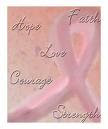Saturday, January 26, 2008
The Importance of Early Detection
Early detection can save your life and give you lots more options. Do it now.
Monday, January 21, 2008
Lumpectomy vs. Mastectomy
Many surgeons believe that small, local cancers usually are amenable to lumpectomies, which means removal of the tumor and its surrounding margin of normal tissue - rather than mastectomy, which removes the entire breast. Whether lumpectomy or mastectomy, patients with invasive cancers undergo a node-mapping procedure, in which a few lymph nodes are removed and examined to determine whether the cancer has spread to the lymph nodes in the armpit. In most cases, a lumpectomy is followed by radiation to prevent a recurrence. In some cases, patients also receive a course of chemotherapy or hormone therapy, he says.
The fact is, far more women will die of cardiovascular disease that cancer, but, of all the cancers a woman can get, most women fear breast cancer the most.
Sunday, January 20, 2008
Welcome to Breast Cancer Answers
I'm so glad you found my blog. Although I have never had a breast cancer diagnosis, I have worked with many women friends, relatives and clients who have had a breast cancer diagnosis. It has got to be terrifying and sometimes it has many misconceptions for the patients.
My goal is to cover most of the initial questions that a woman has and also solicit your comments and questions. I hope that you will find comfort and hope here. One of the initial questions is "how could I know if I migt have breast cancer?"
Early breast cancer usually does not cause pain. In fact, when breast cancer first develops, there may be no symptoms at all. But as the cancer grows, it can cause changes that women should watch for:
A lump or thickening in or near the breast or in the underarm area.
A change in the size or shape of the breast.
A discharge from the nipple.
A change in the color or feel of the skin of the breast, areola, or nipple (dimpled, puckered, or scaly).
A woman should see her doctor if she notices any of these changes. Most often, they are not cancer, but only a doctor can tell for sure.







